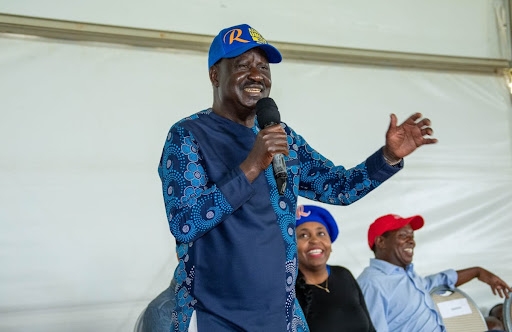'The Big Sad Nairobi', a stop motion film featuring a goat personifying a human being and emotions, tells a story of the daily struggles of an ordinary Kenyan on a normal day.
The urge to not give up while going through life's challenges leaves one questioning their existence.
The film is a creation of Inkspace Bureau with Sheldon Mutei and Kyansimire Oroni being the brains behind the short film.
Speaking to the Star, Oroni said the end product was a success as they worked with a group of people with different skillsets who made the project come alive.
"The message we are passing to our audiences is that one can still achieve their dreams even when the world is trying to pin them down. It takes a lot of strength to find yourself rather than giving up," Oroni said.
The film focuses on mental health and the burden of forgiveness. "What feels daunting? Forgiveness," the character questions himself.
The project took Oroni and his team two weeks to complete it. Starting from the conception stage, scripting, coming up with a storyboard and creating characters.
Oroni said his fascination with stop motion came about with his first experience of watching the television series 'Pingu'.
"The fact that one can build these characters with their own hands, employ amazing techniques like art and colour to build magical sets and characters, mesmerised me."
Films offer simpler ways to relay messages compared to other mediums.
"Kids who have a hard time reading will be able to relate with films," said Oroni. He adds that films can also help people deal with certain emotions when going through something relatable to the storyline. Emotions such as fear, love and losing a loved one.
The film has had two screenings this year, with the recent one at Docubox and the next scheduled later in October.
MILLET
This is another incredible short film. Written and directed by Lydia Matata (2019), it will resonate well with Kenyans when you compare it to the current happenings surrounding the death of church members in Shakahola.
In the film, Kaje is kicked out of school for fighting. She is forced to go on a two-day prayer retreat as a punishment at a church where her mother is a member.
At the church, Kaje discovers her mother and the rest of the members are being starved by being forced to eat one small bowl of millet per day. In contrast to Prophet Livingstone, who secretly eats well-prepared food regularly despite coming up with the rule.
In order to rescue her mother, Kaje must prove that the prophet eats more than what he offers to his flock.
"In hindsight, I think my film was speaking about the future before it really happened," said Matata while addressing an audience during a recent screening of the film at Docubox.
In another interview, Matata noted that films offer the best medium as they´re easily accessible and resonate well with audiences despite their cultural and educational background.
THE ENEMY WITHIN
Lea Kilenga was diagnosed with sickle cell anaemia when she was six months old. She defied the odds after being told she wouldn't live past her adolescent years.
All her sisters have the same condition.
In addition, she lost her older sister, Magdalene, to the same disease just before her fifth birthday. Now in her early thirties, Lea has committed to increasing awareness and advocating for the government to better address the needs of patients like herself.
In her film, ´Sickle Cell: The Enemy Within', produced by Sam Soko of LBx Africa, based in Nairobi, in collaboration with Docubox and BBC Africa, she narrates her journey and experiences the residents of her hometown go through while seeking treatment and medicine, which is hardly available or already expired.
Twenty-four per cent of people in Taita Taveta are living with sickle cell. That is nearly one in four of the residents, making it one of the highest rates of the genetic disease in the country.
According to WHO, two-thirds of people affected by sickle cell worldwide live in Africa.
Albert Loghwaru, who is also featured in the film, says two of his seven children have sickle cell anaemia. "Our neighbours gossip in the village that my children either have demons who suck their blood or are HIV-positive," he said.
The stigma attached to the disease drives many to resort to witchcraft and herbal remedies, often shrouded in secrecy due to the embarrassment associated with the condition. Most people believe it's an ancestral curse.
The film is available for watching on YouTube.











